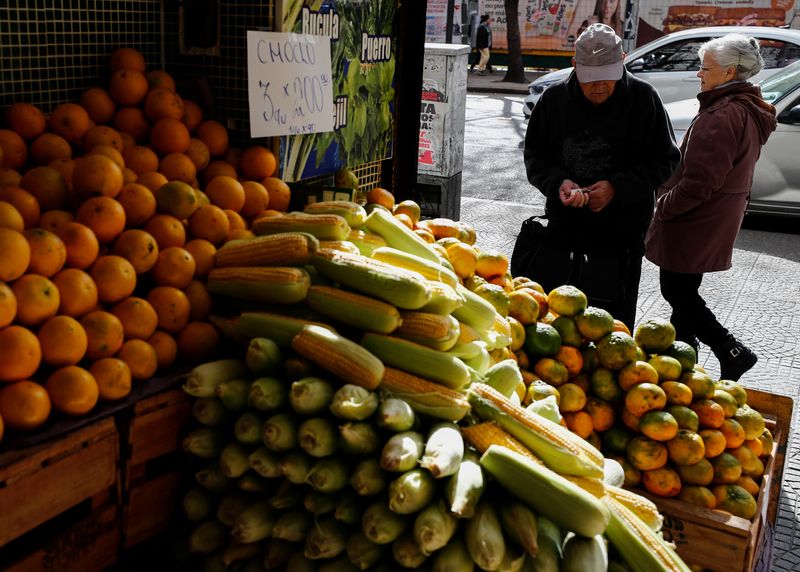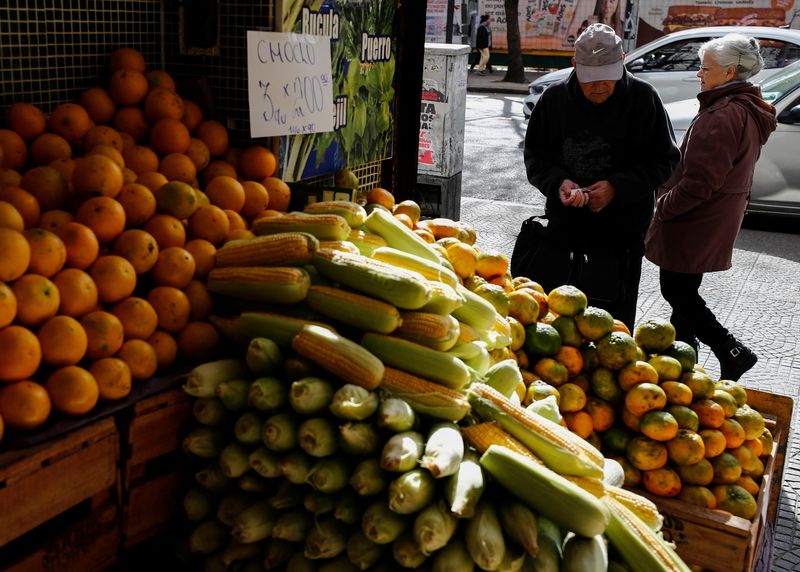Economy
Argentina inflation likely sped back up ahead of primary vote, analysts say


© Reuters. A costumer counts money before buying tangerines in a green grocery store, as Argentines struggle amid rising inflation, in Buenos Aires, Argentina May 11, 2023. REUTERS/Agustin Marcarian
By Hernan Nessi
BUENOS AIRES (Reuters) – Argentina’s monthly inflation rate likely sped back up to 7.1% in July, a Reuters poll of analysts showed, a blow for the ruling Peronist coalition, which is battling to avoid defeat by the conservative opposition in primary elections on Sunday.
The sharper expected rise in the Consumer Price Index (CPI) would halt a run of slowing monthly inflation readings since a peak of 8.4% in April and underline how hard to budge inflation has become in the embattled South American nation.
Argentina has one of the highest inflation rates in the world, with the annual reading near 116%, which hammers earning power, has forced the government to hike the interest rate to 97%, and seen it burn through dollars to protect the peso.
“The monthly increase exceeded that of June, in part due to a spike in tourism linked to the winter holidays, which saw big moves in recreation (prices) in the month,” said consultancy C&T Asesores Económicos.
The projections from 19 local and foreign analysts ranged from a minimum 5.9% rise to a maximum 7.9% jump in the month.
The peso currency, controlled in official markets by tight capital controls, has in recent days hit record lows of over 600 to the dollar in parallel markets, more than twice the formal price. That’s stoked further price rises, analysts said.
“We saw a significant acceleration in the vast majority of prices surveyed during the month, especially from the third week (of July), coinciding with the sky-rocketing of the black-market peso and new government measures,” added consultancy C&T.
Argentina’s government in late July ordered measures to encourage exports of some products and discourage imports with the goal of protecting central bank foreign currency reserves, estimated to be deep in negative territory on a net basis.
Alejandro Giacoia, economist at consultancy Econviews, said the spike in prices was partially linked to the slide in the peso in parallel markets, as well as rising food prices, which would play into August inflation too.
Many analysts saw a tough outlook for prices in the months ahead due to economic uncertainty, fiscal imbalances, and volatility ahead of the general election in October.
“There are several factors that we believe mean CPI will continue to accelerate in August,” said Eugenio Marí, chief economist of the Libertad y Progreso consultancy, citing market imbalances, government money printing and new taxes.
Argentina’s INDEC statistics agency is expected to publish inflation data next week after the primaries. The central bank has postponed the regular publication of its monthly market analyst survey until after the election.
Economy
Russian central bank says it needs months to make sure CPI falling before rate cuts -RBC


© Reuters. Russian Central Bank Governor Elvira Nabiullina attends a news conference in Moscow, Russia June 14, 2019. REUTERS/Shamil Zhumatov/File Photo
MOSCOW (Reuters) – Russia’s central bank will need two to three months to make sure that inflation is steadily declining before taking any decision on interest rate cuts, the bank’s governor Elvira Nabiullina told RBC media on Sunday.
The central bank raised its key interest rate by 100 basis points to 16% earlier in December, hiking for the fifth consecutive meeting in response to stubborn inflation, and suggested that its tightening cycle was nearly over.
Nabiullina said it was not yet clear when exactly the regulator would start cutting rates, however.
“We really need to make sure that inflation is steadily decreasing, that these are not one-off factors that can affect the rate of price growth in a particular month,” she said.
Nabiullina said the bank was taking into account a wide range of indicators but primarily those that “characterize the stability of inflation”.
“This will take two or three months or more – it depends on how much the wide range of indicators that characterize sustainable inflation declines,” she said.
The bank will next convene to set its benchmark rate on Feb. 16.
The governor also said the bank should have started monetary policy tightening earlier than in July, when it embarked on the rate-hiking cycle.
Economy
China identifies second set of projects in $140 billion spending plan


© Reuters. FILE PHOTO: Workers walk past an under-construction area with completed office towers in the background, in Shenzhen’s Qianhai new district, Guangdong province, China August 25, 2023. REUTERS/David Kirton/File Photo
SHANGHAI (Reuters) – China’s top planning body said on Saturday it had identified a second batch of public investment projects, including flood control and disaster relief programmes, under a bond issuance and investment plan announced in October to boost the economy.
With the latest tranche, China has now earmarked more than 800 billion yuan of its 1 trillion yuan ($140 billion) in additional government bond issuance in the fourth quarter, as it focuses on fiscal steps to shore up the flagging economy.
The National Development and Reform Commission (NDRC) said in a statement on Saturday it had identified 9,600 projects with planned investment of more than 560 billion yuan.
China’s economy, the world’s second largest, is struggling to regain its footing post-COVID-19 as policymakers grapple with tepid consumer demand, weak exports, falling foreign investment and a deepening real estate crisis.
The 1 trillion yuan in additional bond issuance will widen China’s 2023 budget deficit ratio to around 3.8 percent from 3 percent, the state-run Xinhua news agency has said.
“Construction of the projects will improve China’s flood control system, emergency response mechanism and disaster relief capabilities, and better protect people’s lives and property, so it is very significant,” the NDRC said.
The agency said it will coordinate with other government bodies to make sure that funds are allocated speedily for investment and that high standards of quality are maintained in project construction.
($1 = 7.1315 renminbi)
Economy
Russian central bank says it needs months to make sure CPI falling before rate cuts -RBC


© Reuters. Russian Central Bank Governor Elvira Nabiullina attends a news conference in Moscow, Russia June 14, 2019. REUTERS/Shamil Zhumatov/File Photo
MOSCOW (Reuters) – Russia’s central bank will need two to three months to make sure that inflation is steadily declining before taking any decision on interest rate cuts, the bank’s governor Elvira Nabiullina told RBC media on Sunday.
The central bank raised its key interest rate by 100 basis points to 16% earlier in December, hiking for the fifth consecutive meeting in response to stubborn inflation, and suggested that its tightening cycle was nearly over.
Nabiullina said it was not yet clear when exactly the regulator would start cutting rates, however.
“We really need to make sure that inflation is steadily decreasing, that these are not one-off factors that can affect the rate of price growth in a particular month,” she said.
Nabiullina said the bank was taking into account a wide range of indicators but primarily those that “characterize the stability of inflation”.
“This will take two or three months or more – it depends on how much the wide range of indicators that characterize sustainable inflation declines,” she said.
The bank will next convene to set its benchmark rate on Feb. 16.
The governor also said the bank should have started monetary policy tightening earlier than in July, when it embarked on the rate-hiking cycle.

 Forex2 years ago
Forex2 years agoForex Today: the dollar is gaining strength amid gloomy sentiment at the start of the Fed’s week

 Forex2 years ago
Forex2 years agoHow is the Australian dollar doing today?

 Forex1 year ago
Forex1 year agoUnbiased review of Pocket Option broker

 Forex2 years ago
Forex2 years agoDollar to pound sterling exchange rate today: Pound plummeted to its lowest since 1985

 Cryptocurrency2 years ago
Cryptocurrency2 years agoWhat happened in the crypto market – current events today

 World2 years ago
World2 years agoWhy are modern video games an art form?

 Stock Markets2 years ago
Stock Markets2 years agoMorgan Stanley: bear market rally to continue

 Economy2 years ago
Economy2 years agoCrude oil tankers double in price due to EU anti-Russian sanctions

































